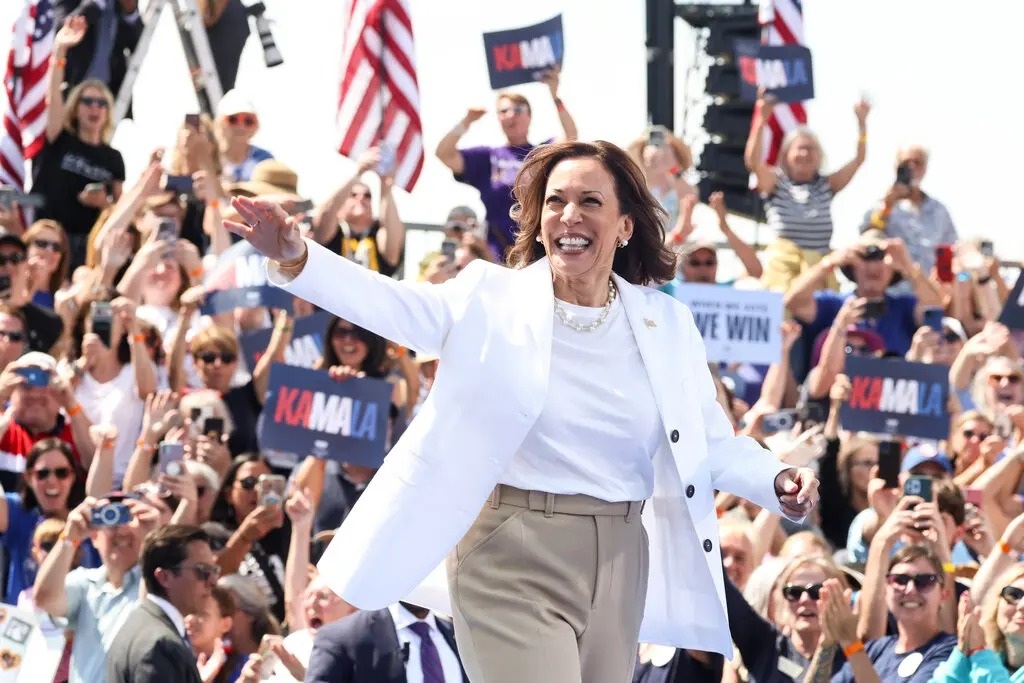Incumbent President Joe Biden, who won the primaries, unexpectedly announced on July 21 that he was suspending his campaign due to pressure from within his party after a “disadvantaged” debate with Republican candidate Donald Trump. He supports passing the “torch” to Vice President Kamala Harris.
This helps the Democratic Party restart the election campaign that had not had much prospect before, and at the same time closes one of the most chaotic months in recent American political history.
3 weeks of Ms. Harris and the Democratic Party turning things around
Vice President Kamala Harris has officially secured the Democratic Party’s presidential nomination. Harris is the first woman of color to be nominated by a major U.S. party, marking a turning point in an election that has long been divided along racial and gender lines.
While Ms. Harris’s campaign largely inherited Mr. Biden’s, having Ms. Harris as the one to deploy it has given new hope to Democrats who have increasingly given up hope of defeating Mr. Trump.
Despite entering the race late, Ms. Harris is showing the ability to turn the tide. According to a survey released on August 10 by the New York Times, Ms. Harris leads Mr. Trump in important battleground states such as Michigan, Wisconsin and Pennsylvania.
In May, even before the debate, polls showed Mr. Biden either tied with or trailing Mr. Trump in battleground states.

Shortly after entering the race, Ms. Harris hired a new batch of senior campaign advisers, replacing Biden loyalists with other veteran Democrats.
One of Harris’ most talked-about choices is her vice presidential running mate, Tim Walz.
Together, Ms. Harris and Mr. Walz bring new faces to this year’s election – another “plus” for the Democratic Party. Previously, gave American voters two choices, both of which were old faces from the previous election, Mr. Biden and Mr. Trump.
Mr. Walz is expected to campaign in traditionally Democratic states like Pennsylvania, Michigan and Wisconsin, where Ms. Harris hopes he will appeal to white and non-college voters who make up a large portion of those battleground states.
The Harris-Walz pair are also working to win back loyal, progressive voters. Polls show that Latinos are very concerned about housing and the economy, which could be key themes in Harris’s campaign in those states.
Most black voters still plan to vote for the Democrats, but Mr. Biden’s poor campaign has caused some support to shift to Mr. Trump, especially among young black voters.
Harris, whose father is Jamaican-American, could use her ethnicity to appeal to these voters. But strategists say she will need to focus on the policy concerns of African Americans if she wants to win back their support. That includes a strong economic message and tough-on-crime policies.
Ms Harris has tried to mobilize women of colour – a key Democratic constituency that helped Mr Biden win the Democratic nomination in 2020.
In addition to the advantage of being new and supporting black voters, Ms. Harris also has the advantage of age, being nearly 20 years younger than Mr. Trump. Age, which was once a strength, has become a weakness for Mr. Trump.
Mr Biden’s campaign has previously suffered from a loss of support from young people who typically vote Democratic but have drifted away from the party over his support for Israel and concerns about his age.
Young voters are important to Democrats because they often act as volunteers during campaigns.
With a different message than President Biden, Ms. Harris also seems to create new vitality for the election campaign.
Harris’ first campaign video was released today, featuring Beyoncé’s “Freedom.”
The messages are different, but the core theme is similar to what Mr. Biden said in his re-election campaign launch video.
Specifically, President Biden wants his campaign to focus on “democracy” and the Capitol Hill riots, while Ms. Harris wants to focus on “freedom” and “the future”, addressing issues of poverty, gun violence and abortion rights.
The issue of Israel also has a big influence on voters. When Mr. Biden was running, many Arab-American voters said they would not vote in November to protest Mr. Biden’s support for Israel in the Gaza war.
Within days, Ms Harris had taken a much tougher stance, asserting her support for the US’s “unwavering” alliance with Israel, but also criticising Israel’s handling of its campaign in Gaza.
That approach could help Democrats hold a state like Michigan, which is highly valued in the US electoral college system.
The new energy is making Harris’s campaign a donor magnet. The Harris campaign announced it raised $310 million in July, its biggest haul so far in the 2024 cycle and double what Trump raised last month. More than $200 million of that came just a week after Biden announced he was ending his campaign.
Officials supporting Ms. Harris’s campaign also reported that, overall, they had raised $1 billion, the fastest fundraising pace ever achieved by a presidential campaign.
Harris’s Difficulty
While things may look bright for the Democratic Party with Harris’s presidential nomination, challenges lie ahead. Her experience as a California prosecutor may help her in her debates against Trump, but it is also seen as one of her biggest weaknesses.
Harris’s background as a prosecutor is why she has often struggled to articulate her vision for the country. Compared to politicians who are governors or members of Congress, prosecutors often have less experience crafting a message about their policy vision. This was evident early in her campaign when she sometimes struggled to articulate her own policies, especially on Medicare.
Her poll numbers were so weak that she dropped out before the Iowa caucuses. As vice president, she has made some pretty evasive statements.
Another reason she has struggled to articulate her message may be that Harris has rarely had to address the swing voters who decide presidential elections. She hails from California, where Democrats dominate, and she seems to struggle to make arguments about pocketbooks, global trade and border security.
Another major challenge for Ms. Harris is the problems of the current administration, of which she is currently vice president. Previous polls show that Mr. Biden’s campaign has been struggling for months. His immigration and economic policies are not supported. The current administration’s negative reputation will certainly greatly affect her image in the eyes of voters.
As for the situation in the Middle East, Mr. Biden’s continued support for Israel in the war in Gaza has eroded his support among young voters.
Despite Harris’s remarkable efforts to convince voters, the reality is that even within her own party, she is not entirely trusted. Only about 6 in 10 Democrats trust her more than Trump to do a better job handling the war in Gaza, the lowest percentage in her party on any issue.
Finally, there is the issue of gender bias among American voters. With Kamala Harris becoming the Democratic nominee, this will raise an important question for American voters: Is the country ready for its first female president? Especially since Americans have never elected a woman to the White House.
Polls have found a large gender gap in whether Harris and Trump are strong leaders. Detailed results from Marquette University show that while white women are only slightly more likely to describe Trump as strong than Harris, the former president’s advantage over her exceeds 25 points when polling white men.
A New York Times/Siena poll in July found that about 1 in 6 white men without a college degree said they viewed Ms. Harris as a strong leader. Those ratings could make it difficult for Ms. Harris to maintain the minimum level of male support she needs to win.
In other words, despite the party’s rising morale, Ms. Harris begins the presidential race from a weak position. To win, she will need a “both offensive and defensive” strategy to effectively deal with Republican nominee Donald Trump.
Trump’s election strategy is in disarray
Despite facing many challenges, Ms. Harris’s campaign will certainly force Mr. Trump to adjust his campaign strategy.
Less than a month ago, Mr Trump’s team was confident of a landslide victory in the November election. Now, things are different.
“The race has changed,” Corey Lewandowski, a longtime Trump adviser, told Reuters, admitting that they would rather run against Biden because Trump would have a better chance of winning.
His opponent now is not the candidate his team has been working hard to identify. His opponent is the first black female vice president of the United States.
Trump aides said they wanted to defeat Vice President Harris by portraying her as a San Francisco liberal who is responsible for illegal border crossings and inflation. But in the past few days, Trump has repeatedly abandoned that message and turned to a more familiar line: personal attacks.
Mr Trump’s attacks have proven effective in the past, forcing his opponents to spend time on defense rather than addressing issues. This is especially true for female candidates and even more difficult for Ms Harris, who has faced attacks on her race and gender.
People close to Mr. Trump are skeptical that personal attacks on Ms. Harris will be effective. Instead, they want Mr. Trump to take a stand on food prices, gas prices, illegal border crossings and praise his foreign policy legacy, while avoiding any mention of his opponent’s race or gender.
Mr Trump’s team also sought to tie Ms Harris to controversial policies of President Joe Biden’s administration.
Concerns about the economic and social situation under President Biden have helped Republicans dominate most of the election process so far.
As vice president, Ms. Harris will have more or less the entire footprint of the current administration, which is why Republicans have tried to pin immigration controversies on Ms. Harris.
In addition, Mr. Trump’s team also attacked Ms. Harris’s prosecutorial record.
Ms. Harris, a former prosecutor and attorney general of California, has faced “all kinds of criminals.”
The Trump campaign has criticized her for being too tough, especially on men of color who commit drug crimes. This attack is intended to undermine support for Harris from some voters. They also cite cases where Harris has chosen not to prosecute or granted pardons to individuals who have committed new crimes.
Still, some Republicans worry that the former president’s aggressive tactics are driving the campaign in a divisive direction that could hurt the party itself. David Kochel, a longtime Republican strategist, said the attacks, especially on race, were unnecessary and dangerous.
Mr. Trump’s attack strategy could even backfire while the Harris-Walz couple focuses on policy issues such as refugees and immigration, fighting inflation, women’s rights to decide on abortion, social justice, respect for democracy and the rule of law.
According to analysts, with less than 3 months to go until the election, Mr. Trump needs to find a new message to attract voters’ support, when facing a younger and more dynamic candidate.





